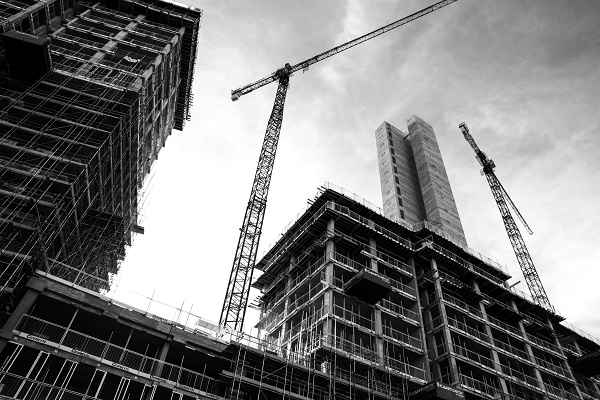As a father, I am building cathedrals
I’m cleaning the kitchen. Dishes are piled up in the sink, and breadcrumbs leave a trail of evidence to my childish culprits away from the dining table. I’m in the zone as I fill the dishwasher, bobbing my head along with Radiohead and Thom Yorke’s falsetto taking me back to high school with Fake Plastic Trees. Then, out of nowhere, I hear a shout, then another. Then a scream and pounding feet as both daughters run into the kitchen.
They talk over one another trying to place their innocence before me. Someone hit someone after someone stole a toy or perhaps a Lego or a blanket. I’m not quite sure because I’m still half-listening to Thom Yorke and hoping they will resolve the situation together. Then a shove and a slap and Thom Yorke is forgotten just as “The Tourist” hits a coincidental crescendo.
“Okay, slow down! Both of you need to take a deep breath,” I take one too and squat down to get eye-level. “Now, one at a time, plead your case.”

I am a fixer
I immediately go into Fixer mode. I’m a dad. Ninety percent of my job is fixing toys and relationships. I’m okay with the former, fifty-fifty on the latter. When I talk with other dads, I hear similar sentiments and reactions. And for many of us, it is a safe role. Traditionally, moms run the house and set the rules. Media and history tell me so, but my parents bucked that trend in the 1980s.
After they share their perspectives and realize fault is shared, the day continues, and I go back to the dishes and Radiohead. My job as a Fixer is done. Then, a thud and shouts, and they come storming back down. My job is not done. The band-aid didn’t hold, and the dam has broken.
In truth, our family is broken. The ongoing impact of the pandemic has strained all of us and society too. After a year, the day-to-day is a battle of small fixes here and there. We are in survival mode, but surviving, or better yet, triaging our daily lives doesn’t work for long. We are running out of fingers to jam into the cracks.
I want to be more than a Fixer, more than reactionary. But I find myself falling into this schema of Fixer and punting the bigger issue down the road more than I care to admit.
I want to be a builder
What I really want to be is a Builder. I want to see my children with potential, like I did when they were born, not a problem to fix. I want to imagine them standing on the Nobel stage accepting some grand honor or atop the gold medal platform at the Olympics. I want them coming home with stories of deep and fulfilling friendships and jobs that make them hunger for more. I want to dream big with them.
I attended a training with Trabian Shorters, the Visionary and Founder of the BMe Community last week. He opened his training with the basic paradigm that we are all Builders or Fixers, and this informs how we see the world. The current Millennial generation are primarily Builders, while Baby Boomers (most of our country’s leadership) are Fixers because they grew up in a world broken following World War II.
As these leaders age out, they will naturally be replaced by Gen X and then by Millennials. (Btw, I’m in that weird hybrid generation stuck between Gen X and Millennials having grown up with an analog childhood and thrust into digital world at the start of college). This shift is taking place in my household every day. Like most kids, mine are imaginative. They see a pile of Lego bricks and transform it into a spaceship/house that can simultaneously live on Mars and the bottom of Earth’s ocean. They take a pile of sticks and become explorers of the Amazon while texting with friends on Pluto, which to them has always been a dwarf planet.
Their antics spur memories of my youth when I was unencumbered by the trappings of adulthood. They are Builders without even knowing it. I was a Builder without even knowing it too. I have much to re-learn from them.

Photo by Ben Allen
Balance the structures and rules of the house
The challenge for parents, and dads especially, is to balance the structures and rules of the house with the freedom to explore and imagine. It is to find a middle ground between training them to challenge the status quo while still listening to you. And the hardest part for dads is to connect emotionally and express yourself because our society doesn’t value men who express their emotions beyond a laugh or a few tears when their team wins a big game.
As I squat in the kitchen, looking at them with battle lines etched into their gazes, I forget about Radiohead, the dishes, and the long list of to-dos. I take a deep breath and ask them, “If I play with you, will you stop fighting?”
My youngest’s face instantly morphs into a huge smile while my eldest shouts, “That’s what we wanted!”
Seconds later, I’m wearing who knows what from our make-believe box while eat a bowl of plastic fruit. I’m not sure where I am, but it isn’t my house and only music I hear are the off-key hymns of a seven-year-old and four-year-old marching around me.
I know the kitchen isn’t completely clean and I haven’t seen the carpet in our playroom in weeks, but my daughters don’t need a Fixer right now. They need a Builder.
I look at their joy and realize that they actually don’t need a Fixer at all because they are not broken. The systems we’ve created around us, and them, are broken. While I am doing my part to dismantle patriarchal systems and educate my daughters to do the same, in this moment, I’ll focus on playtime.
My daughters will be Nobel prize winners and Olympic athletes. Within those tiny bodies are the blueprints for so many things. The components are sitting there just waiting to be assembled.
I have a choice to make as a father. I can see those components as something to fix, or worse, remove. Or I can see them for what they are.
I choose the latter.
I choose to build cathedrals.
